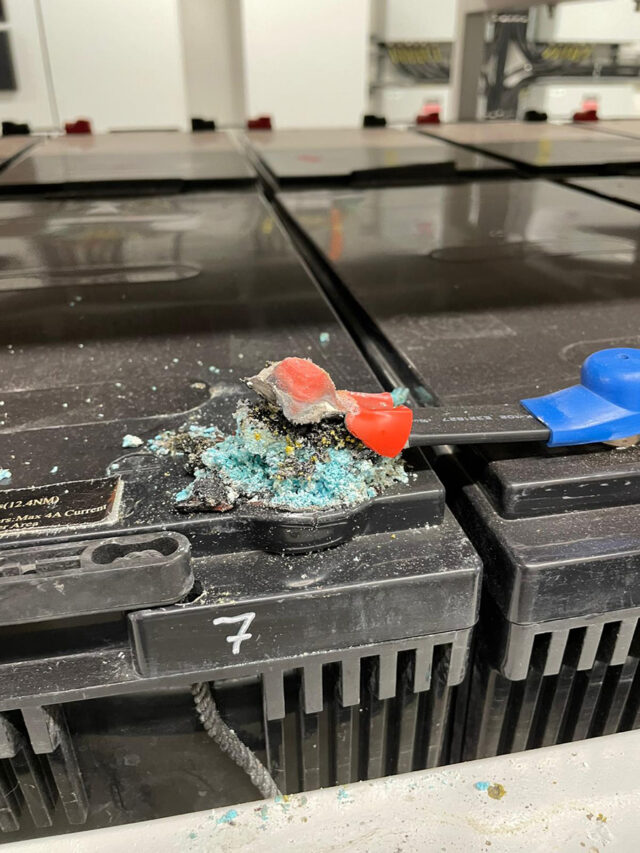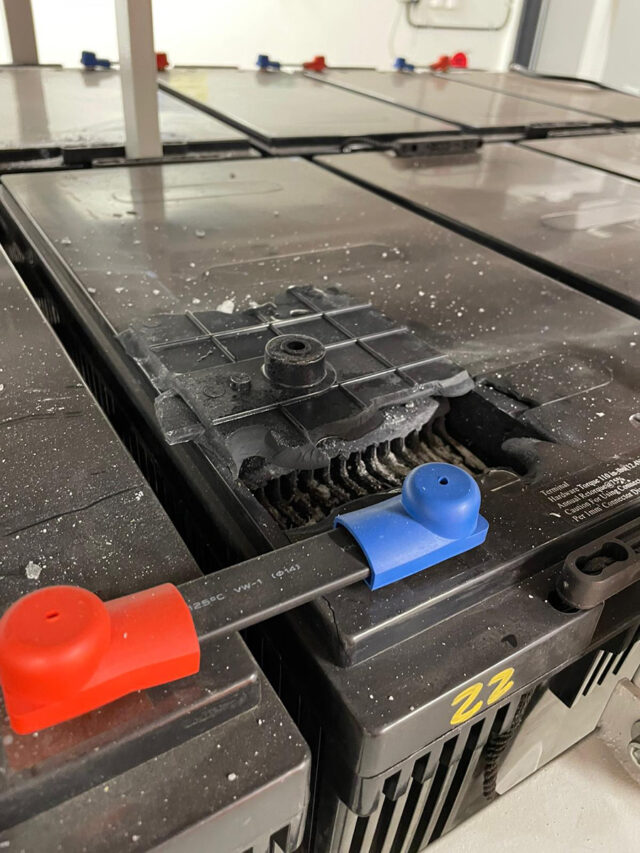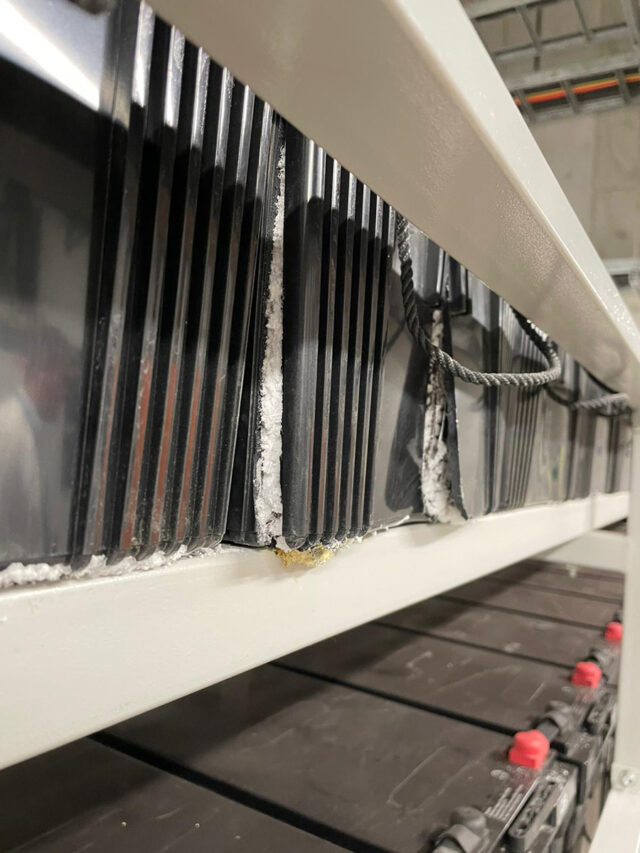 During a recent visit to a major transport infrastructure site, our team at National Power Solutions (NPS) identified multiple UPS batteries showing severe corrosion, degradation, and swelling, a clear wake-up call about the importance of regular maintenance and keeping on top of battery replacements for reliable power protection.
During a recent visit to a major transport infrastructure site, our team at National Power Solutions (NPS) identified multiple UPS batteries showing severe corrosion, degradation, and swelling, a clear wake-up call about the importance of regular maintenance and keeping on top of battery replacements for reliable power protection.
The Problem
The unfortunate fact is that UPS batteries naturally wear out over time, and it’s not just down to age – heat exposure, bad ventilation, and internal chemical breakdown can all do their part in making them degrade faster than they need to. Without proactively getting on top of servicing and looking after their environment, this can lead to all sorts of problems with system performance and serious risks to operations.
We saw all of this in the batteries we inspected – they were at risk of:
- The terminals leaking or corroding
- Running out of juice and providing an unstable power supply – leaving critical infrastructure vulnerable
- Giving up completely and shutting the whole power protection system down with no protection
- Potentially causing safety issues and a lot of costly downtime
What Causes Battery Degradation to Happen
 Understanding what’s causing battery degradation in the first place is key to making sure your UPS system is running safely and securely. There are a few key factors that can affect how your batteries perform and how long they last – whether you’re using lead-acid batteries, VRLA batteries, or lithium-ion UPS batteries.
Understanding what’s causing battery degradation in the first place is key to making sure your UPS system is running safely and securely. There are a few key factors that can affect how your batteries perform and how long they last – whether you’re using lead-acid batteries, VRLA batteries, or lithium-ion UPS batteries.
- Temperature: If it’s either too hot or too cold, it can reduce the lifespan of your battery. Excessive heat can cause the internal bits to break down, especially in lead acid and VRLA batteries, while cold conditions can make it harder for the battery to give you the power you need when you need it. Keeping the temperature in a stable, moderate range is crucial for making sure your battery lasts as long as it should.
- Depth of Discharge (DOD): If you’re regularly discharging your batteries right down to zero, it can make them wear out faster, especially if you’re using lead-acid batteries. Keeping the DOD under 50% helps keep your battery healthy and makes sure your UPS is ready to roll when you need it most.
- Aging: All batteries have a lifespan – it’s just a matter of time before the chemical reactions inside start wearing them down. Lithium-ion UPS batteries tend to last longer than lead-acid or SLA batteries, which makes them a good bet for places where reliability and longevity are top priority.
- Charging Cycles: The more times a battery is charged and then discharged, the more it’s going to wear out in the long run. Lithium-ion UPS batteries can take more of these cycles than traditional lead-acid batteries, which is handy in situations where power is fluctuating all the time.
- Maintenance: If you don’t keep an eye on your batteries and do the odd bit of maintenance now and then, you can run into problems like corrosion and loose connections, which can speed things up. Regular maintenance is the key to catching any early signs of wear and making sure all your battery types are performing as they should.
- Manufacturing Defects: Sometimes, batteries can have faults built into them during production – things like faulty cells or dodgy assembly. Buying from reputable suppliers and choosing top-notch products is a good way to reduce the risk of these types of problems.
Finding the right battery for your UPS system is all about getting the right balance of cost-effectiveness, reliability, and the specific benefits of each type of battery. Lead-acid batteries are a cost-effective solution for big power needs, while lithium-ion UPS batteries offer top-notch reliability and a long lifespan. VRLA batteries – including SLA types – are popular for their low maintenance requirements and ability to cope with hot and cold temperatures.
By understanding and taking action on the causes of battery degradation, you can reduce the risks, extend the lifespan of your batteries, and find the best solution to keep your power infrastructure secure and reliable. Regular maintenance, proper storage, and choosing the right battery for the job are all key to making sure your UPS system delivers uninterrupted protection when you need it most.
 The Solution
The Solution
After NPS inspected the batteries and shown the customer what was going on, we provided a detailed report with our recommendations for a battery replacement and some suggestions for how they could improve their maintenance schedule in future. Our service team also reinforced the importance of ongoing preventative maintenance and regular battery health checks to keep the system running smoothly and safely.
UPS batteries typically need to be replaced every 3-5 years (or sooner if you spot any signs of swelling, leaks, or heat damage). Regular servicing can help identify potential issues before they become major problems, which keeps downtime to a minimum and reduces the overall cost of ownership.
Takeaways
Our visit served as a stark reminder of the importance of proactive maintenance – it highlighted a few key lessons for businesses that rely on their critical power infrastructure:
- Swollen batteries are a clear warning sign that something’s about to go wrong
- Environmental factors like heat, dust and poor ventilation all add up to make degradation a whole lot worse
- Regular servicing is the key to spotting potential risks before they become actual problems and do any damage
Outcome
By acting quickly, we were able to help the customer avoid a potentially disastrous system failure, and make sure their critical transport infrastructure kept on running smoothly and reliably.
Partner with NPS for Power Reliability
At NPS, we help businesses across Australia and New Zealand look after and optimise their power infrastructure with scheduled maintenance programs, proactive servicing, and timely battery or UPS replacements.
Book a battery health check today and talk to our team about how we can help you prevent any nasty surprises and keep your business running like clockwork.
